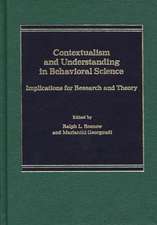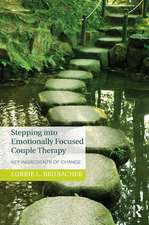Wisdom and Compassion in Psychotherapy: Deepening Mindfulness in Clinical Practice
Editat de Christopher Germer, Ronald D. Siegelen Limba Engleză Paperback – 19 noi 2014
Bringing together leading scholars, scientists, and clinicians, this compelling volume explores how therapists can cultivate wisdom and compassion in themselves and their clients. Chapters describe how combining insights from ancient contemplative practices and modern research can enhance the treatment of anxiety, depression, trauma, substance abuse, suicidal behavior, couple conflict, and parenting stress. Seamlessly edited, the book features numerous practical exercises and rich clinical examples. It examines whether wisdom and compassion can be measured objectively, what they look like in the therapy relationship, their role in therapeutic change, and how to integrate them into treatment planning and goal setting. The book includes a foreword by His Holiness the Dalai Lama.
| Toate formatele și edițiile | Preț | Express |
|---|---|---|
| Paperback (1) | 282.41 lei 3-5 săpt. | +24.69 lei 4-10 zile |
| Guilford Publications – 19 noi 2014 | 282.41 lei 3-5 săpt. | +24.69 lei 4-10 zile |
| Hardback (1) | 462.33 lei 3-5 săpt. | |
| Guilford Publications – 17 apr 2012 | 462.33 lei 3-5 săpt. |
Preț: 282.41 lei
Preț vechi: 297.28 lei
-5% Nou
Puncte Express: 424
Preț estimativ în valută:
54.06€ • 58.74$ • 45.44£
54.06€ • 58.74$ • 45.44£
Carte disponibilă
Livrare economică 31 martie-14 aprilie
Livrare express 14-20 martie pentru 34.68 lei
Preluare comenzi: 021 569.72.76
Specificații
ISBN-13: 9781462518869
ISBN-10: 1462518869
Pagini: 407
Dimensiuni: 152 x 229 x 23 mm
Greutate: 0.54 kg
Ediția:1
Editura: Guilford Publications
Colecția Guilford Press
ISBN-10: 1462518869
Pagini: 407
Dimensiuni: 152 x 229 x 23 mm
Greutate: 0.54 kg
Ediția:1
Editura: Guilford Publications
Colecția Guilford Press
Public țintă
Professional Practice & DevelopmentCuprins
Introduction, Christopher K. Germer & Ronald D. Siegel
I. What Are Wisdom and Compassion? Why Should We Care?
1. Wisdom and Compassion: Two Wings of a Bird, Ronald D. Siegel & Christopher K. Germer
2. Mindful Presence: A Foundation for Compassion and Wisdom, Tara Brach
3. Building Lives of Compassion and Wisdom, Barbara L. Fredrickson
II. The Meaning of Compassion
4. Compassion in Buddhist Psychology, John Makransky
5. The Compassionate Therapist, Elissa Ely
6. The Science of Self-Compassion, Kristin D. Neff
7. Cultivating Compassion in Psychotherapy, Christopher K. Germer
8. The Neurobiology of Compassion, Richard J. Davidson
III. The Meaning of Wisdom
9. Wisdom in Buddhist Psychology, Andrew Olendzki
10. The Wise Psychotherapist, Ronald D. Siegel
11. The Science of Wisdom: Implications for Psychotherapy, Robert J. Sternberg
12. The Wisdom of Connection, Janet Surrey & Judith V. Jordan
13. Self and No-Self in Psychotherapy, Jack Engler & Paul R. Fulton
14. Neurobiological Foundations of Wisdom, Thomas W. Meeks, B. Rael Cahn, & Dilip V. Jeste
IV. Clinical Applications
15. Wisdom, Compassion, and Suicidal Patients, Marsha M. Linehan & Anita Lungu
16. Substance Abuse and Relapse Prevention, G. Alan Marlatt, Sarah Bowen, & M. Kathleen B. Lustyk
17. Anxiety Disorders: Acceptance, Compassion, and Wisdom, Lizabeth Roemer & Susan M. Orsillo
18. Depression: Suffering in the Flow of Life, Paul Gilbert
19. Working with Trauma: Mindfulness and Compassion, John Briere
20. The Heart of Couple Therapy, Richard Borofsky & Antra K. Borofsky
V. In and Around the Consultation Room
21. Mindful Parenting as a Path to Wisdom and Compassion, Trudy Goodman, Susan Kaiser Greenland, & Daniel J. Siegel
22. Drawing on the Wisdom of Religious Traditions in Psychotherapy, Kenneth I. Pargament & Carol Ann Faigin
23. Compassion and Wisdom: Growing through Ethics, Stephanie P. Morgan
I. What Are Wisdom and Compassion? Why Should We Care?
1. Wisdom and Compassion: Two Wings of a Bird, Ronald D. Siegel & Christopher K. Germer
2. Mindful Presence: A Foundation for Compassion and Wisdom, Tara Brach
3. Building Lives of Compassion and Wisdom, Barbara L. Fredrickson
II. The Meaning of Compassion
4. Compassion in Buddhist Psychology, John Makransky
5. The Compassionate Therapist, Elissa Ely
6. The Science of Self-Compassion, Kristin D. Neff
7. Cultivating Compassion in Psychotherapy, Christopher K. Germer
8. The Neurobiology of Compassion, Richard J. Davidson
III. The Meaning of Wisdom
9. Wisdom in Buddhist Psychology, Andrew Olendzki
10. The Wise Psychotherapist, Ronald D. Siegel
11. The Science of Wisdom: Implications for Psychotherapy, Robert J. Sternberg
12. The Wisdom of Connection, Janet Surrey & Judith V. Jordan
13. Self and No-Self in Psychotherapy, Jack Engler & Paul R. Fulton
14. Neurobiological Foundations of Wisdom, Thomas W. Meeks, B. Rael Cahn, & Dilip V. Jeste
IV. Clinical Applications
15. Wisdom, Compassion, and Suicidal Patients, Marsha M. Linehan & Anita Lungu
16. Substance Abuse and Relapse Prevention, G. Alan Marlatt, Sarah Bowen, & M. Kathleen B. Lustyk
17. Anxiety Disorders: Acceptance, Compassion, and Wisdom, Lizabeth Roemer & Susan M. Orsillo
18. Depression: Suffering in the Flow of Life, Paul Gilbert
19. Working with Trauma: Mindfulness and Compassion, John Briere
20. The Heart of Couple Therapy, Richard Borofsky & Antra K. Borofsky
V. In and Around the Consultation Room
21. Mindful Parenting as a Path to Wisdom and Compassion, Trudy Goodman, Susan Kaiser Greenland, & Daniel J. Siegel
22. Drawing on the Wisdom of Religious Traditions in Psychotherapy, Kenneth I. Pargament & Carol Ann Faigin
23. Compassion and Wisdom: Growing through Ethics, Stephanie P. Morgan
Recenzii
"I am very happy to see that ancient teachings and practices from the Buddhist tradition can be of benefit today when they are employed by Western scientists and therapists. In today's world, many people turn to psychotherapy to understand what is making them unhappy, and to discover how to live a more meaningful life. I believe that as they come to understand compassion and wisdom more deeply, psychotherapists will be better able to help their patients and so contribute to greater peace and happiness in the world."--from the Foreword by His Holiness the Dalai Lama
"The essential message of this book is one of hope. Ably guided by the contributors to this important volume, therapists are invited to peer beyond therapeutic tools and techniques and glimpse the vast potential that compassion and wisdom hold for healing and self-transformation."--Zindel Segal, PhD, Distinguished Professor of Psychology in Mood Disorders, University of Toronto–Scarborough, Canada
"A rich introduction to--and rigorous exploration of--the current dynamic convergence of Buddhist psychology and Western psychotherapy. Thoughtful and eminently practical, this timely volume will be a key reference for counselors and psychotherapists, and is also important reading for students preparing for careers in the field. It will serve those looking for ways to offer the fruits of their personal mindfulness practice to their clients and colleagues."--Sharon Salzberg, author of Lovingkindness and Real Love"The essential message of this book is one of hope. Ably guided by the contributors to this important volume, therapists are invited to peer beyond therapeutic tools and techniques and glimpse the vast potential that compassion and wisdom hold for healing and self-transformation."--Zindel Segal, PhD, Distinguished Professor of Psychology in Mood Disorders, University of Toronto–Scarborough, Canada
"The deep message of the movement toward acceptance- and mindfulness-based methods is that the world without and the world within are interlinked. We need to begin to treat ourselves as we would want others to treat us: with kindness, patience, and wise attention. This book explores profound issues and describes powerful new methods for clinical practice that will carry far beyond the doors of our consulting rooms."--Steven C. Hayes, PhD, codeveloper of acceptance and commitment therapy; Foundation Professor of Psychology Emeritus, University of Nevada, Reno
"With this enlightening volume, Germer and Siegel bring the dialogue between contemporary psychotherapy and Buddhist psychology to a new level, proposing that compassion and wisdom--like mindfulness--are capacities that can be deliberately cultivated to promote health and well-being. Enlisting contributions from fields as diverse as neuroscience, theology, trauma studies, and positive psychology, Germer and Siegel have put together a book that is stimulating, scholarly, and, above all, clinically relevant. This book illuminates fresh directions and resources for psychotherapy, bringing an inspiring sense of possibility to the 'impossible profession.'"--David J. Wallin, PhD, private practice, Mill Valley and Albany, California
"This book examines the nature of wisdom and compassion in psychotherapy from every conceivable perspective. Buddhist psychology, neurobiological foundations, psychological research, and clinical applications all receive thoughtful and comprehensive treatment. Clinicians, scholars, teachers, and students interested in the alleviation of human suffering will appreciate this volume, especially its emphasis on the cultivation of mindfulness and loving-kindness skills as paths toward the wisdom and compassion that are so essential to effective psychotherapy."--Ruth A. Baer, PhD, Department of Psychology, University of Kentucky
-A welcomed addition to a clinical social worker's library….The editors have thoughtfully organized this book to be inclusive of multiple ways of knowing and viewing the world. It is not often that ethics, spirituality, neuroscience, philosophy, and professional development are combined into one resource for social workers. The authors approach their argument for the centrality of wisdom and compassion within psychotherapy from a Buddhist tradition; however, a practitioner from any spiritual tradition will find themes that resonate and can be applied to their work.--Social Work and Christianity, 11/17/2015ƒƒA...very important aspect of this book is its breadth of perspectives on the topic....Will appeal primarily to practicing psychotherapists who desire an in-depth conversation about the theory and research of compassion and wisdom because it has a heavier focus on practice than do some other volumes. The other nice aspect of this volume is that the Buddhist foundations for the concepts used in therapy are very clearly laid out. Because Part III focuses on specific clinical applications of principles of compassion and wisdom introduced throughout earlier sections, it will appeal to clinicians working with these specific groups.--PsycCRITIQUES, 1/23/2013
Notă biografică
Christopher Germer, PhD, is a clinical psychologist and Lecturer on Psychiatry (part-time) at Harvard Medical School. His books with Kristin Neff include The Mindful Self-Compassion Workbook and Mindful Self-Compassion for Burnout (for the general public) and Teaching the Mindful Self-Compassion Program (for professionals). Dr. Germer is also author of The Mindful Path to Self-Compassion and coeditor of Mindfulness and Psychotherapy and Wisdom and Compassion in Psychotherapy. He lectures and leads workshops internationally and has a small psychotherapy practice in Massachusetts. His website is https://chrisgermer.com
Ronald D. Siegel, PsyD, is Assistant Professor of Psychology, part time, at Harvard Medical School/Cambridge Health Alliance, where he has taught since the early 1980s. He is a longtime student of mindfulness meditation and is a faculty and board member at the Institute for Meditation and Psychotherapy. Dr. Siegel teaches internationally about the application of mindfulness practices in psychotherapy and other fields, and maintains a private practice in Lincoln, Massachusetts. His books include The Mindfulness Solution, for general readers, as well as several acclaimed works for professionals.
Descriere
Bringing together leading scholars, scientists, and clinicians, this compelling volume explores how therapists can cultivate wisdom and compassion in themselves and their clients. Chapters describe how combining insights from ancient contemplative practices and modern research can enhance the treatment of anxiety, depression, trauma, substance abuse, suicidal behavior, couple conflict, and parenting stress. Seamlessly edited, the book features numerous practical exercises and rich clinical examples. It examines whether wisdom and compassion can be measured objectively, what they look like in the therapy relationship, their role in therapeutic change, and how to integrate them into treatment planning and goal setting. The book includes a foreword by His Holiness the Dalai Lama.
















